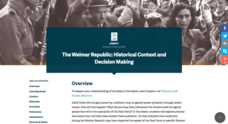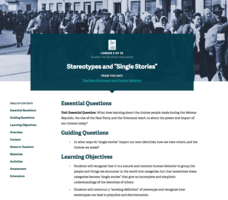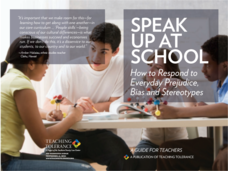Facing History and Ourselves
Why Little Things Are Big
Often our decisions are impacted by a fear of how others see us. That's the big idea in a two-day lesson that asks how false assumptions, how our fear of how others may see us, impact how we act. After watching a video about such a...
Equality and Human Rights Commission
Learning area 3: Explore a Wide Range of Jobs and Challenge Preconceptions
Squash the notion that certain jobs are meant for a boy or girl with a unit comprised of nine activities. Through discussion, videos, audio clips, worksheets, and readings, scholars examine stereotypes related to specific jobs and...
Equality and Human Rights Commission
Learning area 2: Challenging Stereotypes and Discrimination
Six powerful and eyeopening lessons provide scholars with activities designed to challenge stereotypes and discrimination. The unit provides reading material with which pupils read and discuss. Grand conversations lead to physically...
Teaching Tolerance
Using Photographs to Teach Social Justice | Affirming Our Commonalities and Differences
Photos can challenge stereotypes. To gain an understanding of the big picture, groups examine a series of photographs and analyze how a photographer's choices can shape a viewer's reaction to an image. For the first set of photographs,...
Teaching Tolerance
Using Photographs to Teach Social Justice | Exposing Homelessness and Poverty
Photos can capture a complete story in a single image. Class members closely examine a photo of a homeless camp and attempt to read the story told by the picture. They then read the caption for the photograph and compare their notes with...
Teaching Tolerance
Using Photographs to Teach Social Justice | Exposing Gender Bias
Young sociologists are asked to read two photographs, identifying how the photographer uses point of view, color, pose, light, and shadow to express a stereotype of women or to challenge those stereotypes. Partners then create their own...
Teaching Tolerance
Using Photographs to Teach Social Justice | Exposing Racism
Photographs capture a moment in time. And some of the best pictures demand that viewers not only ask questions about why the photo packs such an emotional wallop, but also about what happened before and after it was taken. A photograph...
Teaching Tolerance
Using Photographs to Teach Social Justice | Supporting Social Border Crossings
A lunch-time activity encourages pupils to step out of their usual lunch bunch and connect with someone new. To begin, individuals examine a group photograph and identify what they believe is the gender, race, religion, and sexual...
Western Justice Center
Culture and Identity
To conclude a study of conflict resolution, class members watch and discuss a series of five videos that frame the conversation in terms of culture and identity, understanding bias, oppression, and interpersonal biases.
PBS
Stereotypes vs. Statistics (Grades 9-12)
What is a common stereotype people may think about you; is it true? Using a thought-provoking lesson, high schoolers analyze common stereotypes of the Latino-American population versus statistical data. Scholars review data and have the...
PBS
Who Are Latinos?
What does it mean to be Latino? With an eye-opening lesson plan, pupils discover what it means to be Latino in the United States. They participate in classroom discussions, use graphic organizers, and watch a short video to help them...
Southern Poverty Law Center
Analyzing Gender Stereotypes in Media
Why might toy advertisers use gender stereotypes to sell their products? Young people think critically about media messages and its role in gender stereotyping with a thought-provoking lesson plan.
Race Briges Studio
I am Indopino: Or, How to Answer the Question, "Who Are You?"
In our increasingly multi-ethnic society, many young scholars find it difficult to identify themselves as belonging to any one ethnicity. Gene Tagaban, a Tlingit, Cherokee, Filipino offers his personal experiences with these questions in...
Institute for Humane Education
Selling "Boy" and "Girl"
Monster trucks, action figures, and video games. Are these toys designed for boys or girls? Scholars work in small groups to find and categorize examples of boy and girl toys from catalogs. Next, learners analyze the two sets of pictures...
Equality and Human Rights Commission
Discrimination
Discrimination takes many forms, and lesson eight in the 12-part series addresses many types and their greater impact on society. The lesson uses a presentation, videos, news stories, and discussions to synthesize many different viewpoints.
Equality and Human Rights Commission
Equality
Despite passing the Equality Act in 2010 covering many groups, gender inequality in Great Britain remains. Scholars investigate the concept of equality with a presentation, discussion, and hands-on timeline activities. The seventh lesson...
Equality and Human Rights Commission
Negative Attitudes
A study in the United Kingdom found that approximately 60 percent of workers had heard the term gay used as an insult in the professional workplace. Scholars consider discrimination, negative attitudes, tolerance, and stereotypes in the...
Facing History and Ourselves
Laws and the National Community
When it comes to the law, is justice always served? Teach scholars about how law sometimes enables prejudice of entire groups of people with a unit on World War II that includes a warm-up activity, analysis of primary sources,...
Facing History and Ourselves
Us and Them: Confronting Labels and Lies
Stereotyping and discrimination based on religion catalyze many atrocities in the world. Explain the awful treatment of Jews and the lies Nazis spread by using an informative yet sensitive resource. Learners participate in a warm-up and...
Facing History and Ourselves
Stereotypes and “Single Stories”
Help bring subconscious stereotypes to the surface to stop it in its tracks. Pupils first read an excerpt describing the experience of prejudice and analyze how this process connects to World War II. Then, they write a creative story...
Partners Against Hate
Building Community and Combating Hate
Put a little love in your classroom! Help middle school scholars understand differences among people and build a sense of community within their school through 10 well-organized lessons. Each unique lesson incorporates writing,...
Advocates for Youth
What Are Stereotypes and Gender Roles?
Living up to what society expects of you is difficult enough before you add the complications of sexual and racial prejudice. Discuss the difficulties faced by people in your country, neighborhood, and classroom with a series of...
Broadway GPS
Kinky Boots—The New Musical: Official Show Guide
Drag queens in thigh-high shiny red leather boots! Welcome to Kinky Boots, the Tony Award-winning musical about a young man trying to save his family-owned shoe-making business. With an engaging story line and songs by Cyndi Lauper, the...
Southern Poverty Law Center
Speak Up at School
When someone says something offensive based on prejudice or a stereotype, it's often difficult to know how to react. A packet on tolerance and standing up for others guides teachers to both learn and instruct members of their class to...

























